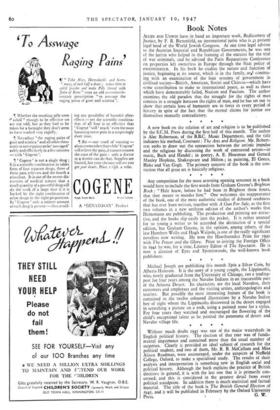Book Notes
ALLEN AND UNWIN have in hand an important work, Rediscovery of justice, by F. R. Bienenfeld, an international jurist who is ;t present legal head of the World Jewish Congress. Ar one time legal adviser to the Austrian Imperial and Republican Governments, he was one of the jurists who helped in the framing of the statutes for the trial of war criminals, and he advised the Paris Reparations Conference on properties left ownerless in Europe through the Nazi policy of exterminaticn. In his bock he studies the nature and function of justice, beginning at its source, which is in the family, aril continu- ing with an examination of the four systems of government in civilised society—British, American, Soviet and Chinese—which have some ccntribution to make to international peace, as well as those which have demonstrably failed, Nazism and Fascism. The author examines the old paradox that the struggle for the rights of man consists in a struggle between the rights of man, and he has set out to show that certain laws of humanity are in force in every period of history in spite of the fact that the eternal claims for justice are themselves mutually contradictory.
* * A new book on the relation of art and religion is to be published by the S.C.M. Press during the first half of this month. The author is Alec Robertson, of the B.B.C. Music Department, and the title indicates his method, Contrasts : The Arts and Religion. Mr. Robert- son seeks to draw out the connection between the artistic impulse and the religious by discussing the work of contrasted artists—in music, Bach and Handel ; in poetry, A. E. Housman and Gerard Manley Hopkins, Shakespeare and Milton ; in painting, El Greco, Blake and Van. Gogh. The primary concern of the book is the con- viction that all great art is basically religious.
* *
Any competition for the most arresting opening sentence in a book would have to include the first words from Graham Greene's Brighton Rock : " Hale knew, before he had been in Brighton three hours, that they meant to murder him." One welcomes the reappearance of the book, one of the most authentic studies of debased seediness that has ever been written, together with A Gun For Sale, as the first two volumes in a new uniform edition of the author's works that Heinemann are publishing. The production and printing are attrac- tive, and the books slip easily into the pocket. It is rather unusual for so young a writer to be accorded the distinction of a special edition, but Graham Greene, in the opinion, among others, of the late Humbert Wolfe and Hugh Walpole, is one of the really significant novelists now writing. He won the Hawthornden Prize for 1940 with The Power and the Glory. Prior to joining the Foreign Office in 1941 he was, for a time, Literary Editor of The Spectator. He is now a director of Eyre and Spottiswoode, the well-known book
publishers. * * * * Michael Joseph are publishing this month Spin a Silver Coin, by Alberta Hannum. It is the story of a young couple, the Lippincolts, who, newly graduated from. the University of Chicago, ran a trading- post for four years among the Navaho Indians in an inaccessible part of the Arizona Desert. Its characters are the local Navahos, their customers and employees and the visiting artists, anthropologists and tourists. But possibly the most interesting feature of the book is contained in the twelve coloured illustrations by a Navaho Indian boy of eight whom the Lippincolts discovered in the desert engaged in scratching a picture on a rock, using a pointed stone for a stylus. For four years they watched and encouraged the flowering of the child's exceptional talent as he painted the panorama of desert and Navaho village life.
Without much doubt 1945 was one of the major watersheds in English political history. The election of that year was of funda- mental importance and contained more than the usual number of surprises. Clearly it provided an ideal subject of research for the political student, and two of them, Mr. R. B. McCallum and Miss Alison Readman, were encouraged, under the auspices of Nuffield College, Oxford, to make a specialised study. The results of their analysis and interpretation is something new in English social and political history. Although the bock explains the practice of British elections in general, it is with the last one that it is primarily con- cerned, and this is considered in the greatest detail from every political standpoint. In additicn there is much statistical and factual material. The title of the book is The British General Election of 1945, and it will be published in February by the Oxford University * * Press. G. W.


































 Previous page
Previous page